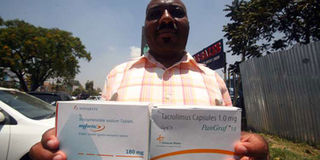Patients at risk as key drugs run out

Martin Mugambi displaying boxes containing drugs he uses during an interview in Nairobi on September 29, 2015. Hundreds — possibly thousands — of patients are at risk of suffering far-reaching health complications due to a shortage of drugs used by recipients of organ transplants. PHOTO | EVANS HABIL | NATION MEDIA GROUP
What you need to know:
- Kenyatta National Hospital and chemists across the country have run out of the life-saving drugs known as PanGraf and Myfortic.
- The two anti-rejection drugs are used together with other medicines, in some cases five tablets or more, to keep allergies and high blood pressure in check.
- The head of the KNH renal unit, Dr Anthony Were, said about four million out of the 40 million Kenyans have some form of kidney disease.
Hundreds — possibly thousands — of patients are at risk of suffering far-reaching health complications due to a shortage of drugs used by recipients of organ transplants.
Kenyatta National Hospital and chemists across the country have run out of the life-saving drugs known as PanGraf and Myfortic. The drugs stop the bodies of the patients from rejecting organs after a transplant.
Those facing the greatest risk are patients who have undergone kidney, liver or heart transplants, as they risk organ rejection.
Those who have had a transplant are required to take the drugs daily for life. They help to suppress the immune response to prevent rejection of the transplanted organs and tissues such as bone marrow, heart, kidney or liver.
If one fails to take the medication, the immune system can attack the transplanted organ, resulting in organ failure, which is fatal.
The two anti-rejection drugs are used together with other medicines, in some cases five tablets or more, to keep allergies and high blood pressure in check.
The drugs cost between Sh15,000 and Sh50,000 a month, depending on the patient and one’s condition.
A source at the Kenyatta National Hospital, Nairobi, who asked not to be named said: “We have been having an irregular supply of the immunosuppressants or anti-rejection drugs this year.”
WITHHOLDING SUPPLIES
At present, the drugs are not available at the KNH.
The source was not sure about what was causing the shortage, but there have been reports that drug manufacturing companies in India are withholding supplies to await a ruling on an international patent case between European firms and their Asian counterparts, who manufacture cheaper generics.
Besides beneficiaries of transplants, patients with severe skin disorders such as psoriasis and other ailments like rheumatoid arthritis, lupus and Crohn’s disease (chronic inflammation of the digestive tract), also require the immunosuppressants.
A spot check at the KNH, where most of the patients get the drugs because they are fairly priced, was met with uncertainty, with the hospital neither confirming nor denying the shortage of the drugs.
The other alternative is for patients to buy the drugs from private hospitals, which according to Mr Martin Mugambi, 39, a kidney transplant patient, “is too expensive to be sustained”.
The head of the KNH renal unit, Dr Anthony Were, said about four million out of the 40 million Kenyans have some form of kidney disease.
A reliable source from Norvatis, who manufacture of one of the two drugs, said: “We have supplied all the required drugs to the various hospitals and we are not aware of the shortage.”
Efforts to get comments from the Cabinet Secretary for Health, Mr James Macharia, and the Director of Medical Services, Dr Nicholas Muraguri, on the matter by the time of going to press, failed.
Mr Macharia, who is attending the UN General Assembly in New York, referred the Nation to Dr Muraguri, who could not be reached.





